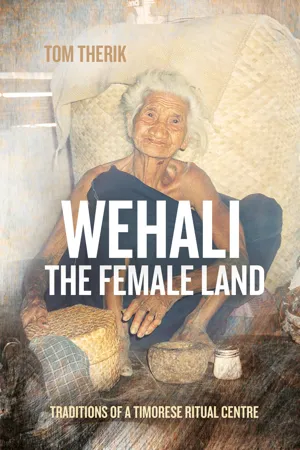
- 438 pages
- English
- PDF
- Available on iOS & Android
About this book
Wehali defines itself as the ritual centre of the island of Timor. As a ritual centre, Wehali continues to be the residence of a figure of traditional authority on whom, in the 18th century, the Dutch conferred the title of Kaiser ( Keizer ) and to whom the Portuguese gave the title of Emperor ( Imperador ). At one time, Wehali was the centre of a network of tributary states, which both the Dutch and Portuguese regarded as paramount to the political organisation of the island. This book is a study of Wehali in its contemporary setting as it continues to maintain its rituals and traditions.
Significantly, Wehali is a 'Female' centre and its 'Great Lord' is considered to be a 'Female' lord. Whereas other Timorese societies are organised along male lines, in Wehali, all land, all property, all houses belong to women. Men are exchanged as husbands in marriage. Wehali is thus considered to be the 'husband-giver' to the surrounding realms on the island that look to its inner power as their source of life.
Frequently asked questions
- Essential is ideal for learners and professionals who enjoy exploring a wide range of subjects. Access the Essential Library with 800,000+ trusted titles and best-sellers across business, personal growth, and the humanities. Includes unlimited reading time and Standard Read Aloud voice.
- Complete: Perfect for advanced learners and researchers needing full, unrestricted access. Unlock 1.4M+ books across hundreds of subjects, including academic and specialized titles. The Complete Plan also includes advanced features like Premium Read Aloud and Research Assistant.
Please note we cannot support devices running on iOS 13 and Android 7 or earlier. Learn more about using the app.
Information
Table of contents
- List of Figures
- List of Maps
- List of Photographs
- List of Tables
- Preface to the 2023 Edition
- Foreword
- Summary
- 1. Introduction
- 2. The Ethnographic Setting
- 3. Two Perspectives on Wehali
- 4. Social Relations: Giving Away the Centre to the Periphery
- 5. Marriage and Alliance
- 6. Paths and Borders: Relations of Origin, Consanguinity and Affinity
- 7. Ancestral Path in the Wehali House
- 8. Life-giving Rituals
- 9. Conclusion
- Language Texts
- Bibliography
- A Note on Language
- Glossary
- Ritual Language Pairs
- Acknowledgements